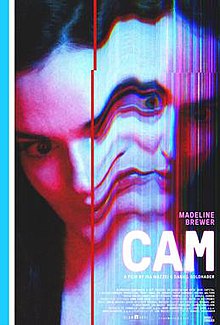
Over the past two decades, the Internet and the navel-gazing social connection it provides has become a dominant, if not THE dominant, force in our everyday lives, dictating what we see, how we act, and who we interact with. Once a tool for the quick sharing of information across digital highways, it has become an uncontrollable beast, devouring outdated concepts like privacy, changing the DNA of our national ethos at a cellular level, and essentially becoming its own alternate world, one that is bigger than the real one we live in. The rise of narcissism-stoking social media has only abetted and hastened that consumption of reality, to increasingly deleterious effects. Two very different films playing at this year’s Fantasia Film Festival, CAM and THE PEOPLE’S REPUBLIC OF DESIRE, demonstrate the ecstatic highs and debilitating crashes of putting our life online to incredibly disquieting effect.
The Blumhouse production CAM, recently picked up by Netflix, goes the genre route in deconstructing the myth of Internet fame being our savior for the need to belong. Isa Mazzei wrote the script based on her own experiences working as a camgirl, enacting flirtatious, erotic scenarios on her webcam to an audience of slavering voyeurs on the other side of the screen. You can feel the realness of Mazzei’s truth right there on screen, even as things deteriorate into increasingly unnerving Hitchcockian horror.
Madeline Brewer gives a star-making performance as Alice, who secretly works as a popular camgirl named Lola (outside her circle of fans and fellow cammers, the only person in Alice’s life that knows what she does for a living is her younger brother.) Alice/Lola is rising in the ranks of popularity on her site, largely thanks to the outré wildness of her sets (faked suicide, anyone?). She hovers just below the Top 50 most popular mark, and her dream is to, at first, crack that barrier, and then move up the list–a difficulty when a rival (THE LOVE WITCH’s Samantha Robinson) tries to sabotage her by luring her fans away to her own chat room.

However, things take a turn for the horrifying one day when Alice wakes, and finds herself locked out of her account. At first thinking its a glitch, Alice is shocked to discover that not only is she locked out–but that she’s also performing. A double has somehow taken over her cam feed, living as her, and there’s nothing Alice can do about. Even when the double begins to do increasingly degrading and privacy-revealing stuff, breaking Alice’s own rules and putting her in danger of violence at the hands of her most obsessed and devoted fans.
Shot in contrasting radioactive neon tones and muted real-world grays, CAM, as directed by Daniel Goldhaber, feels like Brian De Palma doing a J-horror nightmare for the digital age. Alice finds her identity stolen, forced to do things she would never do, and is powerless to stop it. It’s a frightening parable for the entitlement that others feel on your very being online. Not only can your identity be stolen–an increasingly quaint fear as things get worse and worse online–but just being on social media of any stripe gives others the feeling that they can dictate what you can say or do. Alice is forced to watch as her life is torn asunder by the visage of her that is online. She is no different than the James Gunn’s of the world, who can see what they put out being co-opted by others intent on destroying them. Only Alice has a malicious supernatural double rather than a pitchfork-wielding angry mob causing her problems.
CAM is an exceptionally hard, agonizing film to watch–in a good way. It’s a deeply unnerving existential nightmare. The horror comes not from some boogeyman creeping around the corner wielding a butcher knife, but from Alice’s very real panic and hopelessness as she watches the double act in ways that betray her very core values–but is unable to not only stop it, but convince others that it is not her doing. It’s a possession film of an entirely different and more frightening sort.

There’s nothing supernatural going on in THE PEOPLE’S REPUBLIC OF DESIRE, but that doesn’t make it any less sad or frightening. That’s because it’s all real.
THE PEOPLE’S REPUBLIC OF DESIRE is a documentary about one of the biggest fads in Chinese Internet culture: live streaming. Essentially a more open, less eroticized version of camming by way of YouTube-style viral celebrity, where participants, of both sexes, innocently interact with adoring fans who purchase them gifts and trinkets as thanks (though, to be fair, there is plenty of up the ante, sexually speaking, as part of their routines). Director Hao Wu energetically crosscuts between various participants in the live streaming world, from top performers to fans to the agencies that represent and buy votes for their “stars” during annual tournaments designed to decide the top “hosts” in the nation.
Being a host can bring riches and fame, but, of course, it comes at a cost. The film’s most striking focus is on two popular hosts: Shen Man, the number one female host in the country at just 21 years of age, and Big Li, a self-described “diaosi” (loser) comedian who has become something of an icon for other rudderless, low income men who also see themselves as such. Both exude exuberance and love for their fans on screen, but off, it’s a different story, as both succumb to the pressures of keeping up appearances for fame and popularity.

For Shen, she’s already looking down the barrel of irrelevance at just the age of 22–live streaming favors the extremely youthful, especially in women. More than that, she’s the primary breadwinner in her family–her mother left when she was a child, her father was laid off and went into bankruptcy and now she’s the main source of income. She needs to stay on top to survive, and she tries to navigate it while keeping her mostly wholesome image, bombarded by sexist demands to strip nude that she refuses to cater to.
Li, at 25, similarly battles the depression that results from his dehumanizing industry. Effusive and loud to the public–his comedic style can be appropriately surmised as 21st century Sam Kinison–Li struggles in private. A constant loser at the tournaments, often coming in second, he’s determined to win in his fourth year, even enlisting a powerful new agency to back him. But the desire to get on top and prove himself to his fans begins to eat at him from the inside, making him question whether or not he wants to continue.

THE PEOPLE’S REPUBLIC OF DESIRE is a slick, breezy, and flashy documentary, laced with a multitude of colorful on-screen graphics, but a powerful and moving one too. It shows the crippling fear of inadequacy that living on the Internet can bring–the difference between picture-perfect Instagram posts and the realities designed to make them happen. What you see online isn’t necessarily what you see in person, and one doesn’t necessarily know the struggle behind those images and videos you see online. Couple that with the toxic feedback loop of fandom, wherein those even worse off than you find meaning in the image you portray.
Taken together and individually, CAM and THE PEOPLE’S REPUBLIC OF DESIRE offer a sad, terrifying snapshot of our moment in culture, as the Internet and social media has taken over and begun to negate and replace real life. Now, go on Facebook and record your own perfected “story” for everyone to see.

–Johnny Donaldson (@johnnydonaldson)
Tags: Big Li, Blumhouse, Cam, Daniel Goldhaber, documentary, Fantasia 2018, Hao Wu, Horror, Internet, Isa Mazzei, Live-Streaming, Madeline Brewer, Samantha Robinson, Shen Man, Social Media, The People's Republic of Desire, Thriller


No Comments